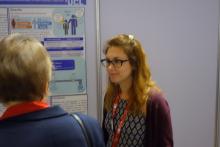BANGKOK –
Chief among those shortcomings is the notoriously poor compliance with these highly restrictive diets, which, as defining features, emphasize high fat intake and scrupulous restriction of carbohydrates in an effort to mimic the metabolic effects of starvation, J. Helen Cross, MD, explained at the International Epilepsy Congress.
She was a coauthor of a study led by Natasha E. Schoeler, PhD, a research dietician at the University College London Great Ormond Street Institute of Child Health, which demonstrated that children and adults with epilepsy who experience a significant antiseizure effect in response to ketogenic diet therapies have higher baseline blood levels of acetyl carnitine (Epilepsia. 2017 May;58(5):893-900).
The importance of this novel observation is twofold: It indicates a potential role for baseline acetyl carnitine level as a predictor of differential response to ketogenic diet therapies, a predictor for which there is an unmet need, and it is consistent with the hypothesis that an important potential mechanism of ketogenic diet effectiveness in epilepsy involves altered mitochondrial energy metabolism. That is because acetyl carnitine plays an essential role in mitochondrial uptake of long-chain fatty acids, noted Dr. Cross, professor of pediatric neurology and head of the developmental neurosciences program at the University College London Great Ormond Street Institute of Child Health.
At the congress sponsored by the International League Against Epilepsy, Dr. Cross and Dr. Schoeler presented the results of the initial 12-week tolerability study of Betashot, a ready-to-use, palatable blend of specific medium-chain triglycerides designed to be consumed three to four times daily with normal meals, limiting only intake of foods high in refined sugar. The Betashot beverage was developed in conjunction with Vitaflo International, a nutritional products company.
“It actually tastes good. It tastes like a strawberry shake,” according to Dr. Schoeler.
The 12-week study included 35 children with genetically caused forms of epilepsy and 26 adults with drug-resistant epilepsy. This was primarily a tolerability and compliance study, and the main finding was that two-thirds of the children and 69% of adults who started the study were still using Betashot at the 12-week mark. Moreover, 91% of the children and 56% of adults who completed the study elected to stay on Betashot afterwards. By week 12, after titrating their daily dose of Betashot upward as tolerated, the pediatric patients averaged 18% of their total daily energy intake from Betashot, the adults 24%.
The most common reasons for discontinuation among both children and adults were gastrointestinal side effects: abdominal discomfort, diarrhea, and/or vomiting.
“What’s exciting is that, even though the study is not powered to look at seizure response – it’s a tolerability study – we can report that there was a statistically significant reduction in the number of seizures in the group overall after 3 months of treatment,” Dr. Cross said.
She declined to provide specific data on seizure frequency because the study was underpowered for that endpoint. However, she added that further larger studies looking at a possible antiseizure effect of Betashot are ongoing.
The Betashot study was funded by Vitaflo International.


